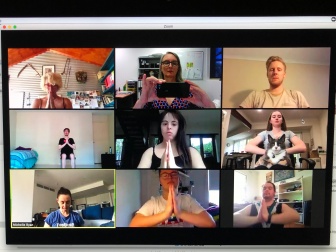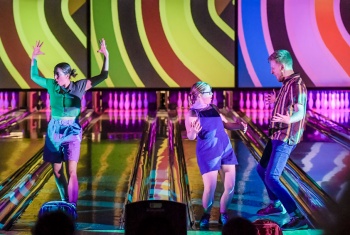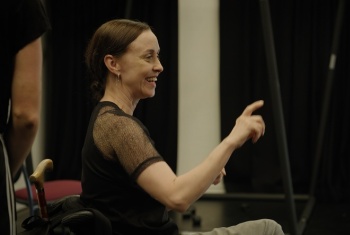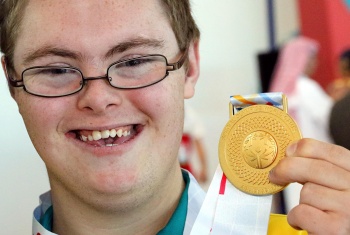Young people living with disability are dancing together from the safety of their own bedrooms and kitchens as they continue their weekly dance classes during the coronavirus health crisis.
Adelaide’s Restless Dance Theatre is ensuring its dancers—many of whom are vulnerable to coronavirus (COVID-19) because of their disability—continue to have the support of their routines, creative exercise, and social connections during the health emergency.
They have taken company training online using video communications so dancers can keep working together and stay healthy, physically and mentally.
The NDIS supports those dancers with disability to attend the company’s workshops through their NDIS plans.
Artistic director Michelle Ryan says the online classes have been a hit.
“As soon as we pegged what was happening, we thought we need to do something that keeps the dancers connected and allows them to continue their rigorous training two days a week, so we very quickly came up with the idea of doing Zoom training,” she said.
Ms. Ryan said tutors and dancers could all see each other, allowing tutors to give corrections and for dancers to help one another.
Dancer and NDIS participant Michael Hodyl, who has Down syndrome, said he enjoyed doing the classes via Zoom.
“I am enjoying 2-day training online, it put me in a good space,” he said. “I am enjoying connecting with everyone through this process. I am finding it easy to connect via Zoom and I am making more creative movements than I have known.
“It's great to connect with my friends, the dancers of the Restless company to keep fit and be creative.”
Michael’s father Roman Hodyl said he is grateful Michael can continue with his classes.
“As Michael is a person with Down syndrome, we appreciate that he is now safely at home with his family, but this can be isolating,” he said.
“I can see that this new online training by Restless will keep him engaged personally and creatively. I know he’s enjoying it because I can hear him laughing. It’s a new way of connecting, but so important.”
Dancer Alexis Luke, who does not have a disability, said he loved taking part in the online workshops and it was great to continue conditioning from home.
“I also think that these sessions are important for everyone as we remain (virtually) social with one another, which is something we must all do in these coming months,” he said.
“It’s nice to feel such a strong sense of unification as a company, both across the dancers and tutors but also with those at the office.”
Ms. Ryan, who lives with Multiple Sclerosis and is also supported by the NDIS, said it’s equally important for her to continue working during the current health crisis.
“I’m not sure what I would do if I wasn’t working, I’d be going slowly crazy,” she said. “It’s very important for me.”
Ms. Ryan said NDIS support with daily activities and physical exercise has given her the energy to continue working fulltime with Restless Dance.
“It’s been fantastic, I’ve been able to access more support than I’ve ever been able to,” she said.
“The great thing is I can get groceries delivered to me, and someone will help with food preparation off site and then drop it off,” she said.
“I’ve also set up someone who will do virtual workouts for me to keep me physically strong. So I’m still receiving all of that support through the NDIS.”



